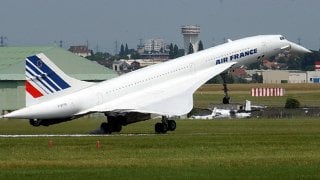Concorde: Why the World’s only Supersonic Jetliner Stopped Flying
The Concorde’s death reads like a soap opera: a fatal accident, terrorism, and a dearth of spare parts.
The Concorde was many things. Innovative and supersonic, it held numerous commercial airline speed records and was the fastest way to travel internationally. Despite several world records and the fastest service money could buy, the joint French-English developed Concorde flew for less than 30 years.
Concorde was done in by a combination of market forces that negatively impacted the aviation industry, a terror attack, and a freak accident.
Air France Flight 4590
On July 25th, 2000, Air France Flight 4590 was on track to lift off from Paris’ Charles de Gaulle airport with New York as its final destination. Though the flight did manage to become airborne, it never made it to the City that Never Sleeps.
While taking off, the AF 4590 struck a piece of metal that had been sitting on the tarmac runway. One of the Concorde’s landing gear wheels struck the metal debris and sent it hurtling into the Concorde’s port, or left, wing.
Concordes were notoriously thirsty birds thanks to their super-sonic flight characteristics. In order to keep their four Roles-Royce turbojet engines satiated, they carried over 200,000 pounds of fuel in 17 internal fuel tanks—one of which was struck by the flying metal piece. The force of the impact caused one of the wing tanks to rupture, spewing jet fuel onto the runway. A stray spark caused the fuel to ignite.
The jetliner was going too fast to abort taking off, and too slow to gain much altitude. Flight AF 4590 crashed into an airport hotel near the end of the runway, killing all 109 passengers and four other people in the hotel.
September 11th Attacks
Just over a year later, the September 11th, 2001 terrorist attacks in the United States caused a massive dip in international travel—much to the detriment of the Concorde. Unlike France’s neighbor the United Kingdom, la République has a less-extensive maritime border.
Aviation regulations mandated that Concordes would have to fly more slowly over land to reduce sound disturbance over the ground. This hit French Concordes particularly hard. After the post-9/11 dip in air travel, the already struggling birds were even less in demand, and therefore less profitable.
Lack of Parts
The aerospace firm Airbus, stopped making spare parts for the world’s Concorde fleets in 2003, as it was no longer economically beneficial to do so. The Concorde was essentially doomed to the boneyard, and the airframes would never fly again.
Postscript
Despite Concorde’s many achievements, it didn’t live long. For comparison, the iconic Boeing 747 was introduced into service in 1970 and went on to become one of the world’s most successful jet airliners—and it still flies today, easily surpassing the Concorde in usefulness. Still, flying aboard a Concorde was an unforgettable experience—despite the hefty price tag.
Caleb Larson holds a Master of Public Policy degree from the Willy Brandt School of Public Policy. He lives in Berlin and writes on U.S. and Russian foreign and defense policy, German politics, and culture.
Image: Reuters

